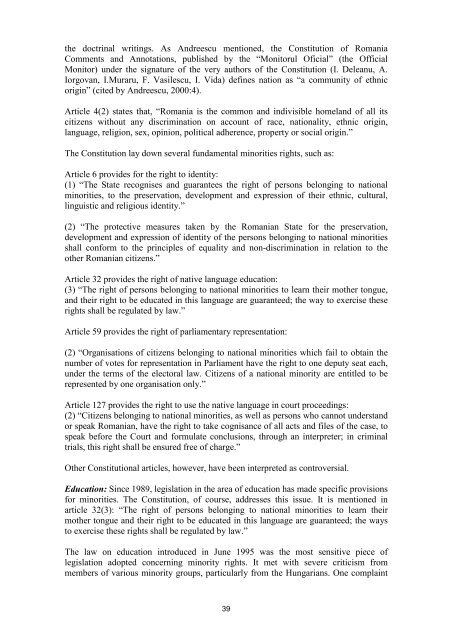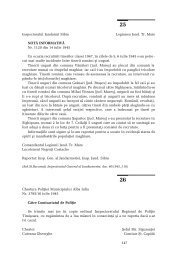Southeast Europe
Southeast Europe
Southeast Europe
You also want an ePaper? Increase the reach of your titles
YUMPU automatically turns print PDFs into web optimized ePapers that Google loves.
the doctrinal writings. As Andreescu mentioned, the Constitution of Romania<br />
Comments and Annotations, published by the “Monitorul Oficial” (the Official<br />
Monitor) under the signature of the very authors of the Constitution (I. Deleanu, A.<br />
Iorgovan, I.Muraru, F. Vasilescu, I. Vida) defines nation as “a community of ethnic<br />
origin” (cited by Andreescu, 2000:4).<br />
Article 4(2) states that, “Romania is the common and indivisible homeland of all its<br />
citizens without any discrimination on account of race, nationality, ethnic origin,<br />
language, religion, sex, opinion, political adherence, property or social origin.”<br />
The Constitution lay down several fundamental minorities rights, such as:<br />
Article 6 provides for the right to identity:<br />
(1) “The State recognises and guarantees the right of persons belonging to national<br />
minorities, to the preservation, development and expression of their ethnic, cultural,<br />
linguistic and religious identity.”<br />
(2) “The protective measures taken by the Romanian State for the preservation,<br />
development and expression of identity of the persons belonging to national minorities<br />
shall conform to the principles of equality and non-discrimination in relation to the<br />
other Romanian citizens.”<br />
Article 32 provides the right of native language education:<br />
(3) “The right of persons belonging to national minorities to learn their mother tongue,<br />
and their right to be educated in this language are guaranteed; the way to exercise these<br />
rights shall be regulated by law.”<br />
Article 59 provides the right of parliamentary representation:<br />
(2) “Organisations of citizens belonging to national minorities which fail to obtain the<br />
number of votes for representation in Parliament have the right to one deputy seat each,<br />
under the terms of the electoral law. Citizens of a national minority are entitled to be<br />
represented by one organisation only.”<br />
Article 127 provides the right to use the native language in court proceedings:<br />
(2) “Citizens belonging to national minorities, as well as persons who cannot understand<br />
or speak Romanian, have the right to take cognisance of all acts and files of the case, to<br />
speak before the Court and formulate conclusions, through an interpreter; in criminal<br />
trials, this right shall be ensured free of charge.”<br />
Other Constitutional articles, however, have been interpreted as controversial.<br />
Education: Since 1989, legislation in the area of education has made specific provisions<br />
for minorities. The Constitution, of course, addresses this issue. It is mentioned in<br />
article 32(3): “The right of persons belonging to national minorities to learn their<br />
mother tongue and their right to be educated in this language are guaranteed; the ways<br />
to exercise these rights shall be regulated by law.”<br />
The law on education introduced in June 1995 was the most sensitive piece of<br />
legislation adopted concerning minority rights. It met with severe criticism from<br />
members of various minority groups, particularly from the Hungarians. One complaint<br />
39









